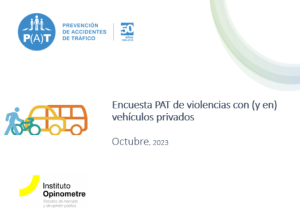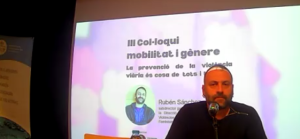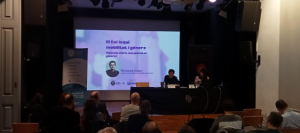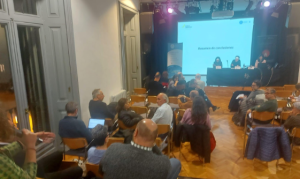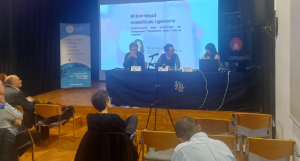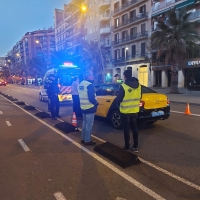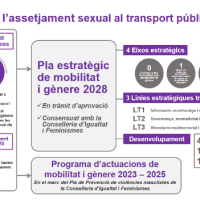
III MOBILITY AND GENDER COLLOQUIUM: A SUMMARY
The III Colloquium wanted to answer all these questions, in addition to making known the results of the survey that P(A)T commissioned from the Opínometre Institute on “violence with and in the vehicle.”
At P(A)T we realized the need to broaden the range of behaviors when we talk about road violence. Many times when we think about traffic violence we only imagine accidents: crashes, accidents, reckless behavior… However, we believe that road violence extends to all these types of violence where the private vehicle is used as a weapon (e.g. an accident), as a facilitator of another crime (e.g. harassment) and as a place of crimes (e.g. assault). Being a new idea, we need the knowledge and experience that each person has to understand the scope of road violence and, thus, be able to confront it.
With this desire, in 2022 we created the “Violence Survey with and in private vehicles”. This year, 2023, we have improved the format of the survey and we have commissioned the Opinòmetre company to exploit the data, in order to have more consistent results.
Through a survey of 400 people from all over Spain, except Ceuta and Melilla, the P(A)T has determined that almost 50% have suffered some type of violence or have witnessed some.
One of the first conclusions of the “Violence with (and in) the private vehicle” survey is that the proportion of men who cause these behaviors is almost five times higher than that of women (which there are also). The disproportion is so high that it constitutes a very relevant point of study by psychology. The victims of violence are, because of the above, the men themselves, which is why it is necessary to analyze what traits make it so, such as arrogance, a feeling of power, competitiveness with other men, abuse and others.
It is worrying to see that, in addition, these behaviors are being transferred to the new generations while the elderly are hardly involved. This result suggests that, as in other areas, the educational system is failing, both in homes and in educational centers.
The results also point to the fact that these violences have an impact in terms of fear both on the part of the people who have experienced these situations and on the part of those who see them. In an advanced society, people have to be able to live their lives without fear, trusting and feeling safe. Therefore we can say that violence in the field of private mobility is a fact and we have to see how we can prevent it.
Here results and summary of conclusions: Informe estudio_PAT-APAT_OPINOMETRE_2023.pdf
This year great specialists accompanied us. Rubén Sánchez, deputy director general of Awareness and Prevention of the General Directorate for the Eradication of Sexist Violence of the Department of Equality and Feminism of the Generalitat of Catalonia, spoke about the prevention of road violence, which has to be everyone’s business. In addition to providing data and an overview of the current situation, he raised the urgency of transforming the prevailing model of masculinity. It seems that patriarchal masculinity is associated with reckless behavior and violation of rules, including an attraction to risk that has serious consequences on mobility.
And this led us to want to answer the question of whether road violence is a gender issue? Dr. Montserrat Crespín Perales (Barcelona, 1976) spoke to us about this topic. She graduated in Law from the Pompeu Fabra University and in Philosophy from the University of Barcelona (UB) from which in 2013 she received her doctorate in Philosophy with Cum laude. She is currently a lecturer at the Faculty of Philosophy of the University of Barcelona, and a researcher at ADHUC-Theory, Gender, Sexuality Research Center of the same university.
In our imagination, we tend to think of “road violence” as only accidents and accidents, also because it is where we focus our efforts when we raise awareness. However, at P(A)T we believe that it is important to approach road violence from an open perspective. That is why it is essential to include all those behaviors where the vehicle is the weapon, the facilitator of another crime or the place of crimes, because it is essential to make a paradigm shift in the values of driving in general and the feeling of impunity and domination that sometimes produces motor driving in some people.
Even so, there is no data or research on the extent of this violence. That is why at P(A)T we have developed the survey “violence with and in vehicles” that we commissioned from the Opinòmetre Institute.
Some examples of road violence would be the threat of vandalizing a car with dents or graffiti, intimidation from another motor vehicle, threats of physical assault or rape inside the vehicle.
Alícia Coduras, the author of the analysis and report of the survey results, presented the results. She has a degree in Economics and Business Sciences (1985) from the University of Barcelona and a PhD in Political and Administration Sciences (1999) from the Pompeu Fabra University. She has extensive experience as a teacher and currently works as a Senior Statistical Technician at the Opinometre Institute.
The data corroborate that men are more prone to violent acts and that we are not doing something right when the youngest have not learned civic behavior and are the most involved in these events.
At the closing of the III Colloquium we were accompanied by Anna Pintó, Deputy Director General of Road Safety of the Catalan Traffic Service. We asked him what measures the Servei Català de Trànsit proposes to eradicate the fact that the vast majority of attendees we meet in the points recovery courses are men. Every week P(A)T witnesses go to driving schools and encounter this reality.
We were also accompanied at the closing by Adrià Gomila, Director of Mobility Services at Barcelona City Council, to whom we suggested that men and women do not have the same mobility patterns or the same priorities when moving, and we asked him what the Mobility Plan contributes. Urbana of Barcelona in relation to this gender perspective. What improvements do you propose to guarantee equality and equity in mobility?
You can listen to the presentations from the last edition at:






